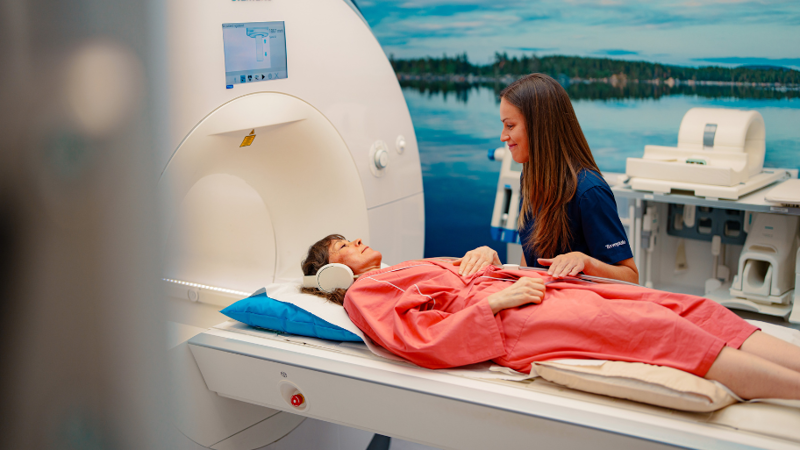Tips from an organisational psychologist: how to create psychological safety in the workplace
Eveliina Holmgren, an organisational psychologist at Terveystalo, explains how to get started in strengthening psychological safety in the workplace.

There are currently three generations in the workforce at the same time, each at a slightly different stage in their lives. Many workplaces already know how to talk about events that affect their personal working lives, such as peak years. However, some topics, such as menopause, are not yet openly discussed. When discussing age-related issues, Eveliina Holmgren recommends starting by having HR or managers talk about the issue and give words to the phenomena. For example, the supervisor does not have to talk about menopause - it can be a confusing situation if menopause is the topic of discussion in a team meeting.
– However, they can say that they are available and willing to listen if team members have work-related issues on their minds that they would like the facilitator to help them sort out.
Menopause, toddlerhood or ageing are as suitable a topic for a wellbeing day as sleep or exercise. Holmgren has spoken about sleep and exercise in many workplaces, but has never been asked to speak about menopause, for example.
Inevitably, menopause or ageing are not topical subjects for the whole group, but that's OK. Research shows that the most productive workplaces are diverse: they inevitably include people of different ages.
- Some have young children, some have teenagers who are fooling around, some have parents to look after and some are going through menopause. Others may have concerns about their own inexperience in the industry.
That's why the workplace can and should talk about any stage of life. The main thing is that everyone wants to put themselves in the other person's shoes and is able to demonstrate that they want to hear and understand the other person.
Start by talking openly. Menopause or ageing may not be topical subjects for the whole group, but that's OK. “
Listening increases the experience of being valued
The managers should be conscious of creating a tolerant and open atmosphere and make it clear that they can be told about different life situations and their effects.
– It is important for people to have the courage to tell you if they have not slept well recently or if their concentration is stagnating.
The managers should be prepared to listen and offer support if needed. They can also talk to their team about wanting to support an appropriate relationship between team members in different situations and work.
"How are you?" or "Is there something that is affecting the way the work is organised and I, as the front person, should know about your situation, or what you would like me to do?" could be good, sensitive questions, Holmgren says. Being listened to goes a long way toward making employees feel valued. Everyone appreciates being allowed to be themselves in the workplace.
Holmgren points out that everyone's ability and performance at work varies, because we are human beings and not machines. We are all human beings at work.
– Workplaces need a humanly efficient culture, where people's efficiency is not spent on maintaining protective armour, but where they can concentrate on their work.
Everyone's ability and performance varies, because we are human beings, not machines. “
How to create psychological safety in the workplace as a manager
- Ensure that people of different ages and backgrounds are recruited to your team and that different life stages and backgrounds are taken into account in job orientation, training and career development.
- Build a culture where everyone feels valued and where different life stages can be discussed. Open communication supports the well-being of the whole work community and builds a genuinely equal working culture.
- Openness and psychological safety do not mean that a manager should ask directly about menopausal symptoms or, say, pregnancy. Instead, it is important to show that there is room for a wide range of people in the team and that as a chaperone you strive to offer support, respect and, where possible, flexibility for team members at different stages of their lives.
- Demonstrate through concrete actions that opportunities for progression are offered to all and that work can be reorganised or tasks shared to accommodate a wide range of life situations.
- Ask employees how you, as a manager, can help them at work or if work arrangements are needed. You may not be able to do everything, but simply being able to bring your own life situation to the attention of a chaperone can be important.
Read more occupational health care articles

How technology helps relieve mental stress: "When the load is high, the threshold must be low."
Mental health disorders have overtaken musculoskeletal disorders, which had long been the leading cause of sick leave. Work is changing, and the range of sick leave caused by mental health issues has also changed. We must be able to offer new solutions to this challenge.

Extensive data set of 200,000 samples: Nightingale study reveals link between illness risks and sick leave
Data from the Finnish Nightingale study, which is used in Terveystalo's occupational health services, reveals a clear link between lifestyle-related health risks and sick leave. The exceptionally extensive data set of over 200,000 customers shows that people with a low risk of illness had significantly fewer absences, while those in high-risk groups had more absences. The results highlight the importance of preventive healthcare in ensuring work ability and the competitiveness of companies.

Strong identification speeds up your service experience when calling us
Soon you can identify yourself easily and securely before your call is answered. Read below to see how the identification process works.

Terveystalo's digital services have been awarded the internationally recognized ISO27001 information security certification.
Terveystalo's information security practices, processes, and risk management are in line with international best practices.

Does massage help relieve stress? – Touch restores and calms the body and mind
Stress is not always visible on the outside, but the body does show signs when the strain increases. According to Lassi Ylönen, a trained massage therapist at Terveystalo Rela, the body often communicates stress through subtle signs.

Circular economy and artificial intelligence boost performance and improve care
At the heart of sustainable healthcare, technology serves as a tool for improving both the quality of care and accountability. Terveystalo favors solutions that combine sustainability, cost-effectiveness, and medical expertise.